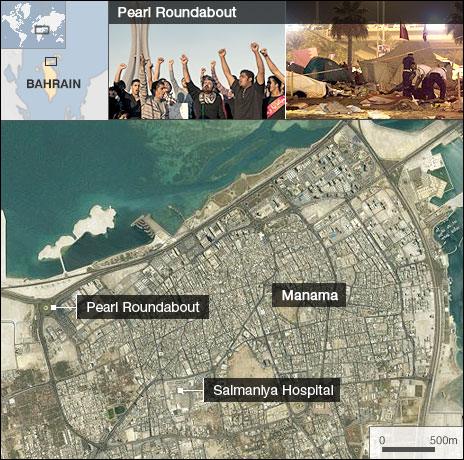Bahrain unrest: UN rights chief criticises crackdown
- Published
'Braving the bullets' in Bahrain
The UN human rights chief has condemned the "shocking" use of force by security forces against protesters in Bahrain.
Navi Pillay said reports of a military takeover of hospitals was a blatant violation of international law.
She urged the authorities to rein in their forces, citing reports of people being beaten and detained or killed.
At least six opposition figures have reportedly been detained in overnight raids in Bahrain, and soldiers are back on the streets of the capital, Manama.
A crackdown on anti-government protesters in the city's centre left at least three civilians and three police officers dead on Wednesday.
Riot police sealed off Manama's main hospital and some smaller health centres, and rights activists said medics were being beaten as they tried to help the wounded in the streets.
"There are reports of arbitrary arrests, killings, beatings of protesters and of medical personnel, and of the takeover of hospitals and medical centres by various security forces," Ms Pillay, the UN High Commissioner for Human Rights, wrote in a statement released on Thursday.
"This is shocking and illegal conduct."
Earlier, the government said it had taken over the hospital because it had become a stronghold of the opposition.
Arrests
The protesters, mostly from the majority Shia population, say the violence will not deter them from challenging Bahrain's Sunni rulers.
The BBC's Caroline Hawley, in Manama, says the streets are calm, but extremely tense, with soldiers patrolling after an overnight curfew.
Rights groups said riot police had fired tear gas on Thursday to disperse small protests in the Shia village of Daih, west of the capital, which is a key opposition area.
They said roads to the nearby villages of Sanabis and Jidhafs were blocked by military vehicles.
A military statement read out on state television said "leaders of the civil strife" had been arrested for communicating with foreign countries and calling for the fall of the regime.
It did not say how many opposition figures had been arrested, nor did it name them.
Opposition groups and rights activists said the arrested men include Hassan Mushaima and Abdeljalil al-Singace from the Haq party, who had been on trial for attempting to overthrow the leadership, although charges were dropped in a bid to calm tensions when unrest began.
More moderate protesters are calling for a constitutional monarchy, resignation of the government and an end to repression and corruption. However, the Haq party wants to set up a republic.
Shia activist Abdel Wahhab Hussein and Ibrahim Sharif, who leads a secularist Sunni party, were also detained.
'Guns pointed'
Matar Ibrahim, a former opposition MP from Bahrain's Shia majority, who recently resigned in protest at the crackdown, told the BBC the government was completely ignoring the message from the US that it was on the wrong track.
The US State Department has also criticised the use of excessive force and Secretary of State Hillary Clinton has called for dialogue.
Mr Ibrahim told the BBC: "We refuse to enter a dialogue while there are guns pointed at our heads."
Bahrain - which has a population of 800,000 and is home to the US Navy's Fifth Fleet - has been thrown into turmoil by the wave of unrest sweeping the Arab world. Protests began there last month.
On Tuesday King Hamad Bin Isa al-Khalifa declared a three-month state of emergency and Saudi troops were called in to keep order.
The following day troops moved in at dawn, backed by tanks and helicopters, to clear the central Pearl Square, where protesters had been camped for several weeks.
The crackdown has prompted sympathy protests from Shias in the region, including in Iran and Lebanon, where a few hundred people staged rallies denouncing the Bahraini and Saudi authorities.
Iran has withdrawn its ambassador to Bahrain, Mahdi Aghajafrari, in protest at the killing of anti-government protesters in Manama.
On Tuesday, the Bahraini ambassador in Tehran withdrew after Iran condemned the arrival of Saudi forces in Bahrain.
Bahrain's Sunni monarchy is closely allied to Saudi Arabia. It has long suspected Iran of encouraging the protesters, who are mostly from the Shia majority.
